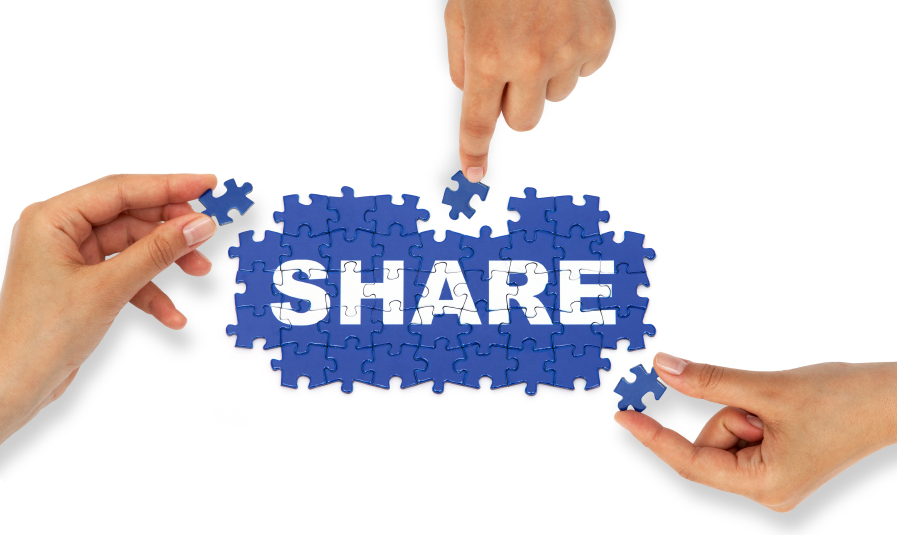Imagine an economic system in which concepts such as profit, margin and supply-and-demand were replaced by trust, participation, sharing, and the responsible, sustainable use of resources. Utopian? Absolutely. Sharing economy.
Utopia, in Greek, can mean both the “good place” or the “non-existing place.” If the good place is good enough, however, it can bring itself into existence. Utopian thinking can generate ideas that eventually become accepted and adopted and no longer seem utopian (in the current sense) at all. Indeed, they become the foundation of business.
For example, a generation ago, if you said a retail operation would make enormous profits by having algorithms suggest new products to individual customers based on their preferences, activities, and shopping histories – and those customers would take those recommendations seriously – you might have been accused of dabbling in science fiction.
Today, of course, Amazon does just that. In fact, 35% of its online sales come from its algorithm-driven product recommendations, according to McKinsey.
Critics of modern economics, sociologists, advocates of cryptocurrencies (Bitcoin, Ethereum, to mention only those with the largest market capitalization), and even the founders of corporations that champion new technologies, all agree: The age we live in is one of the collapse of traditional economics.
Given that, doesn’t it make sense that the technological revolution that has brought us smartphones and peer-to-peer file sharing systems (creating, in the process, new ways to use intellectual property and pursue human relationships) will revolutionize our approach to ownership, profit, and other lynchpins of traditional economics?
Exchanging things, “I” and “Thou” come closer
Allow me to invoke two late figures, one of whom had nothing to do with economics, while the other has for years espoused views that were dismissed as eccentric.
The first is anthropologist Bronisław Malinowski, an outstanding pre-war Polish cultural researcher known for the monumental 1929 work “Życie seksualne dzikich” (“The Sexual Life of Savages”), the second book in a trilogy about the inhabitants of the Trobriand Islands.
In the trilogy’s first book, 1922’s “Argonauci Zachodniego Pacyfiku” (“The Argonauts of the Western Pacific”), Malinowski describes a Kula ritual in which members of Papua, New Guinea tribe travels miles to exchange treasured spiritual objects that custom requires they pass on, and rather soon. The ritual has a significant result: It creates strong interpersonal bonds based on mutual respect. And that, in turn, created a whole new culture centered around the exchange of goods.
The other interesting figure is the American futurist, designer, and inventor Jacques Fresco, who died in 2017 at the age of 101. In the 1960s, he developed “Project Americana,” a scheme in which “sensitive machines” were to cool and clean cities in response to environmental pollution. He advocated for communication between cars to prevent accidents. He devoted himself to promoting economics based on the principle of free and universal access to natural resources. He claimed that at this stage of civilizational advancement, we had everything we needed (natural resources and computer technology) to lay the groundwork for a new economy.
He was a critic of the way the world’s resources were controlled, and saw their monopolization by the few as causing “a constant repeat of the same series of events: war, poverty, recession, boom, bust, and war again.”
Fresco’s solution was to create a system in which nations would declare the world’s resources – clean air and water, arable land, education, health care, energy, and food – a common heritage. All people would have access this heritage via computers which, Fresco noted, “had no ambitions,” and therefore were trustworthy.
A niche growing bigger
The echoes of both Malinowski and Fresco can be seen in today’s most vigorous and promising economic trends. The exchange of resources, the focus on resources availability, an emphasis on building bonds between economic actors, and achieving collective satisfaction are all part of what we refer to today as the “sharing economy.”
That’s no longer Utopian in the sense of “the non-exiting place.” We have come to a point where rich, recognizable brands, such as Airbnb, Uber, and Veturilo, to name just a few, are growing and maintaining a loyal customer base. Although still a niche, the “shared economy” trend is beginning to attract a lot of interest from consumers, investors, and innovators.
Over a quarter of U.S. adult internet users (56.5 million people) used a “sharing economy” service in 2017, according to eMarket.com. In India, the sharing economy is predicted to grow to $335 billion by 2025. And those levels of adoption don’t include such websites as Pinterest and eBay (with its 171 million buyers as of September 2017) which allow people to connect and acquire products without traditional retailers. And while the phenomenon continues to be a niche, it’s not going away, it’s growing, and we can only speculate on how it’s transforming consumer habits.
Trust and communication: Twin pillars in the new economy
Today, the sharing economy is driven by serious money and people ambitious to create something new.
Some of the organizations they create pursue profits and margins (Uber), others seek to stimulate local micro-businesses (Etsy). There are also lesser-known efforts rooted in local markets, such as the UK’s Streetbank, a community that exchanges household appliances and, in so doing, brings people together.
All these initiatives share common characteristics and use similar tools. Together, they make up a fascinating market segment driven by access to the latest technologies: the internet, advanced analytics, and social networks.
Their other common feature is a philosophy and value system based on the realization that every person has resources that can be shared with others. Instead of exploiting goods, people use their private resources, their “spare capacities” (leisure time, vacant housing space, unused cars) to create value – for themselves, certainly, but also for others. In so doing, competition is replaced with trust.
In this new economy, trust has become the key concept, a differentiator, and an economic marker. The key tool are the technologies that allow all participants in the business process to communicate with one another: the internet, smart phones, p2p file sharing, and freeware.
And it would not exist without the explosion of social networking sites on which people connect instantly, creating a massive web of contacts, interests and goals.
Finally, none of this would be possible without the basic tool: the application itself. We may not remember that the rise of consumer software, defined as everyday software, only happened in the last decade.
In the mean time…
A Polish beer producer has recently made headlines by launching a massive advertising campaign with the slogan “tymczasem” (“in the meantime”). I think the word captures the essence of the new economy.
In the meantime, right now, I have free space in the car, a free room in my apartment, and a bit of free time; I choose to share that with you, for my benefit and yours, too, as you will share your resources with me. In this way, one can create business ideas that are economically attractive, even to big capital.
Utopia?
Perhaps not yet. Portugal recently experienced “We hate tourists” protests. Why? Real estate prices have risen sharply because wealthy individuals, many of them foreigners, have been buying apartments to rent them through Airbnb. Similarly, in many cities around the world, taxi drivers protest lost business caused by Uber.
Utopia is not easy. But the sharing revolution, driven by technology, is still unfolding. The age does not yet deserve the title, “The Era of the Sharing Economy.” But I have little doubt it soon will.
YouTube: The rise of sharing economy
Related articles:
– Will a basic income guarantee be necessary when machines take our jobs?
– Only God can count that fast – the world of quantum computing
– Machine Learning. Computers coming of age
– The invisible web that surrounds us, i.e. the Internet of Things
– Blockchain – the Holy Grail of the financial system?
– Fall of the hierarchy. Who really rules in your company?










JacekPlacek5
The sharing economy, as many have noted, has generated enormous wealth. Because the definition of the sharing economy is ambiguous, quantitative analyses of its value are limited.
A PricewaterhouseCoopers study published in 2015 predicts the sharing economy could reach $335 billion in spending by 2025 fueled by five primary components: travel, car-sharing, finance, staffing and streaming.
Norbert Biedrzycki
I’m quite sure than much more than this. Financial services, security …
DCzaj
Money problems: why Finland has given up on the basic income dream
As Finland’s government calls time on a bold experiment in giving citizens cash, can others still attempt such utopian schemes?
https://www.theguardian.com/society/shortcuts/2018/apr/24/finland-given-up-on-the-basic-income-dream
SimonMcD
There is NO service in the service economy. Take for example SHOES. Remember going to your local shoe store? The salesman knew you. He knew about your high arch, your special needs, etc. He took the time to fit you. He knew his product line superbly well. I defy anyone to tell me that such an experience is available today – even though we love Zappos and its competitors.
Same thing with electronics. How many morons are there at Best Buy who know absolutely nothing – I mean NOTHING – about the products they are selling.
What destroyed retail in this country is pricing pressure, pure and simple. Technology has facilitated this, because it is possible to leverage buying power through e-commerce and pass that to the consumer. It is economic theory proven out – but it has done a lot of damage to a lot of communities and put a lot of people who gave that special personal touch out of work.
I love Amazon. Amazing to find anything and everything in a single repository and to buy it expeditiously. But oh what a price we’ve paid. This has nothing to do with “customer centric”. There is NOTHING “customer centric” about Amazon. Technology crushed that-pure and simple.
Check Batin
A basic income guarantee is a system that regularly provides each citizen with a sum of money. Except for citizenship, a basic income is entirely unconditional. A basic income guarantee would radically simplify the welfare state, and truly ensure that no one has to live in poverty. Its necessity will become increasingly obvious as more human labor is replaced by machines.
TomK
The first is that the UBI in effect reduces the value of work to mere income. Making a living is of course a critical element associated with work but social aspects are also crucial. The social value that work provides is an essential source of self-esteem and gives people a structure to their lives and role in society.
There is also the danger of scarring effects. If people leave the labour market and live on the basic income for a prolonged period their chances of re-entering that market become very slim. Accelerated technological change is likely to make existing skills obsolete ever more quickly so it would be quite easy to lose the ability to work and remain stuck on the basic income quasi-permanently.
John McLean
Universal basic income (UBI) in its purest form is a payment that every citizen receives on a regular basis, without condition and as of right, in and out of work. Universal credit is paid on a household basis, is means tested and conditional, for example on recipients proving that they are actively searching for and accepting offers of work. The Finnish trial is not universal, as only 2,000 unemployed people were selected for it, but it is a basic income.
Tom299
By including identity (either tokenized or privacy protection layer) we can allow regulatory controls over the movement of the value.
Tom Jonezz
The revived idea of a Universal Basic Income (UBI) is the cornerstone of the limited policy discussion under way. The idea is, of course, not new but has had numerous incarnations over many decades and been presented as a solution for quite different problems. The one that concerns us here is simply whether UBI could be a solution for large-scale technological unemployment or temporary labour market dislocations that could result from accelerated technological change. When examining the issue in detail it becomes clear that a basic income would not solve many of the key issues. Beyond the obvious question of how to finance a UBI that would be high enough to replace the need to work there are several other reasons for this.
Simon GEE
The internet helps businesses , scientists, artists, doctors, families, entertainment yet it’s also filled with porn, cat pictures, violence and gore. Advanced technology will always branch out, it will never be only used for scientific purpose but for art, business, fun, socializing etc…
Why would he explain what scientific benefits these new technologies would bring when he is clearly not aiming these articles towards scientists. He wants to reach out to more people that’s why he’s giving silly examples.
Adam Spikey
What is the curious case of sharing economy then? Well, regardless of the explosive growth and astoundingly optimistic numbers, an economy solely dependent on user sharing through profitable interactions is failing to gain traction and penetrate the larger consumer base; increased engagement between the 17% of the existing clientele shouldn’t be the top priority here, onboarding the other 83% should be.
Norbert Biedrzycki
26 million car-sharing members globally by 2020 (4m in 2014) and 415,000 shared vehicles (vs 75,000 in 2014). Impact on new cars sales by 0.7%
Don Fisher
…but it’s still only 0,7% of total. Limited impact
Norbert Biedrzycki
Airbnb bookings growth to 60 million by 2020 from 10 million today
Don Fisher
6 times within 2 years. Impressive
John McLean
Airbnb’s legal and rating system troubles and Uber’s pricing woes, there is a greater underlying and ironic problem with sharing economy: most people simply aren’t using it. According to PWC, only 17% of consumers in Europe have participated in it. Rapid expansion without ensuring foolproof safeguards to address consumer’s genuine safety concerns is one of the main reasons for this; highlighting problems is exceedingly easy and entertaining so lets take a road less travelled this time: discussion of a general framework that will help companies to effectively counter trust issues.
TomHarber
Interesting read. And interesting concept. What do you think re BIG?
TonyHor
My entire wardrobe is driven by access over ownership.
It’s what the poor do. It’s how the poor survive.
That said, it’s easy to see what all this is built upon.
… a share poverty. Rebuilt to suit.
JohnE3
This is a very interesting article. It would appear that consumers had a choice to own, or rent. But that is not the case. Adobe Photoshop is a good example as potential sharing economy concept, against the will of many photographers, Adobe decided to move to a cloud rent only business. A few years ago, you could purchase Photoshop for a couple of hundred $ and use it in perpetuity. Now you pay that much for less than a year of cloud use. Adobe can do that because it is a monopoly with enough cash to buy out the competition. Textbooks are another great example where consumers are being forced against their will to pay more. FT’s former parent company Pearson as it the forefront of making education more expensive. A few years ago, one could purchase a used textbook for 50-80% of the original price. Nowadays with web access renting the price of a textbook is as high as of a new print edition. There is no option to purchase used ones, because there are none. Students are being fleeced by unscrupulous companies that have monopolized the textbook market. When the truth is that companies now own more then ever before, including our right to share music, sell used books, or use last year’s software. This was not consumer choice, just as less legroom on airplanes is not. It was forced upon us by oligopolies that should have been regulated ages ago.
DDonovan
Sharing economy is essentially a nice way of comforting millions of poor western millennials. Because real control of their destiny has been shifted to the manufacturing giants in Asia by their political and economic establishment.
As to the ambition of the same class in Asia, they will share until they can own. They are not buying into the non-sense of sharing economy. Remember, India and China are the two largest gold buyers in the world. Think about it.
TommyG
This is a good article. “Sharing” doesn’t mean “renting”, at least not in the term others have expressed below.
Some simple thoughts and facts … what if people’s holiday homes were available to more people (Air bnb) or their own homes were rented when they travel (AirBnB) or they could use their cars to make a living, without paying silly taxes/licence fees like a taxi (Uber), or you sublet a room in your home (1960s or Air BnB).
Bottom line, “sharing” is a good thing. If the tax structure around this isn’t yet right (I raise this as a question only) then don’t throw the baby out with the bath water.
We used to have many more empty homes and under used cars than now.
CaffD
This article is about owning physical things for use, not owning savings. I don’t own many things, I have no property because I hate being in debt and I like the flexibility and hassle free comfort of renting, I have no car because getting the occasional Uber is cheaper in London.
But that doesn’t mean I’m poor. Its just that I’ve invested my money in investment portfolios that keep nicely growing.
It’s a British obsession to think that the only investment worth doing is buying bricks and mortar. That is not so. Especially as the cartel of house owners and politicians artificially restricting supply via planning rules will sooner or later come to an end as this cartel creates too many victims.
Adam T
Manufacturing has been going the way of agricultural jobs at the inception of the industrial age.
Yet sevice jobs pay less. What it does mean is that wealth will further concentrate.
Lastly humans need some tangibles. At least one should hope so. Imagine a sharing economy for marriage… rent it when you need it.
Adam T
The ‘Sharing’ in the Sharing Economy refers to the use and access of shared physical or human resources or assets, rather than the fact that there is no monetary exchange – see wiki. A Sharing Economy enables different forms of value exchange and is a hybrid economy. It encompasses the following aspects: swapping, exchanging, collective purchasing, collaborative consumption, shared ownership, shared value, co-operatives, co-creation, recycling, upcycling, re-distribution, trading used goods, renting, borrowing, lending, subscription based models, peer-to-peer, collaborative economy, circular economy, on-demand economy, gig economy, crowd economy, pay-as-you-use economy, wikinomics, peer-to-peer lending, micro financing, micro-entrepreneurship, social media, the Mesh, social enterprise, futurology, crowdfunding, crowdsourcing, cradle-to-cradle, open source, open data, user generated content and public services.
Simon GEE
The way in which “enhancement” is described here is conflicted with the following concept of wit. Wit is tied into sense of humor, which ties into personality, all of which are traits of the mind that reflect our subjective perception of everything around us.
TomK
Another good read. Looking forward for more
Tom Jonezz
Interesting idea: in order to earn we need to start sharing 🙂
Adam Spark Two
Good read. I strongly believe in this movement of the people
Check Batin
For sociable souls, meeting new people by staying in their homes is part of the charm. By using Facebook and other social networks, participants can check each other out and identify friends (or friends of friends) in common. An Airbnb user had her apartment trashed in 2011. But the remarkable thing is how well the system usually works.
JohnE3
Good point
John Accural
The sharing economy is the latest example of the internet’s value to consumers. This emerging model is now big and disruptive enough for regulators and companies to have woken up to it. That is a sign of its immense potential. It is time to start caring about sharing.
Karel Doomm2
Interesting read
Jack666
Incumbents are getting involved too. Avis, a car-hire firm, has a share in a sharing rival. So do GM and Daimler, two carmakers. In future, companies may develop hybrid models, listing excess capacity (whether vehicles, equipment or office space) on peer-to-peer rental sites. In the past, new ways of doing things online have not displaced the old ways entirely. But they have often changed them. Just as internet shopping forced Walmart and Tesco to adapt, so online sharing will shake up transport, tourism, equipment-hire and more.
Norbert Biedrzycki
Just have a look at energy distribution industry. Incumbents are becoming more tech savvy focusing on blockchain, e.g.; billing systems
Tom Jonezz
… and there is much more applications than this
John McLean
Interesting. What about travel industry? Any potential use-cases?
Adam T
The socialist in government and their elite cronies in the central banks and industry have removed private property for the great majority of citizens, they have no savings or property and are deep in debt. now everybody is a renter and it is not a benefit or virtuous. this stupid woman. how can you have a future if you have nothing for a rainy day and have saved nothing tangible to spend in retirement. if you save their phony paper money it melts like an ice cube in your hand. a thousand dollars today is worth 100 dollars in purchasing power 20 years from now. is that financial security. no it is keynesian crime
TommyG
Not correct
Mac McFisher
Consider eBay. Having started out as a peer-to-peer marketplace, it is now dominated by professional “power sellers” (many of whom started out as ordinary eBay users). The same may happen with the sharing economy, which also provides new opportunities for enterprise. Some people have bought cars solely to rent them out, for example.
Simon GEE
The sharing economy is a little like online shopping, which started in America 15 years ago. At first, people were worried about security. But having made a successful purchase from, say, Amazon, they felt safe buying elsewhere. Similarly, using Airbnb or a car-hire service for the first time encourages people to try other offerings.
Adam Spikey
Such “collaborative consumption” is a good thing for several reasons. Owners make money from underused assets. Airbnb says hosts in San Francisco who rent out their homes do so for an average of 58 nights a year, making $9,300. Car owners who rent their vehicles to others using RelayRides make an average of $250 a month; some make more than $1,000.